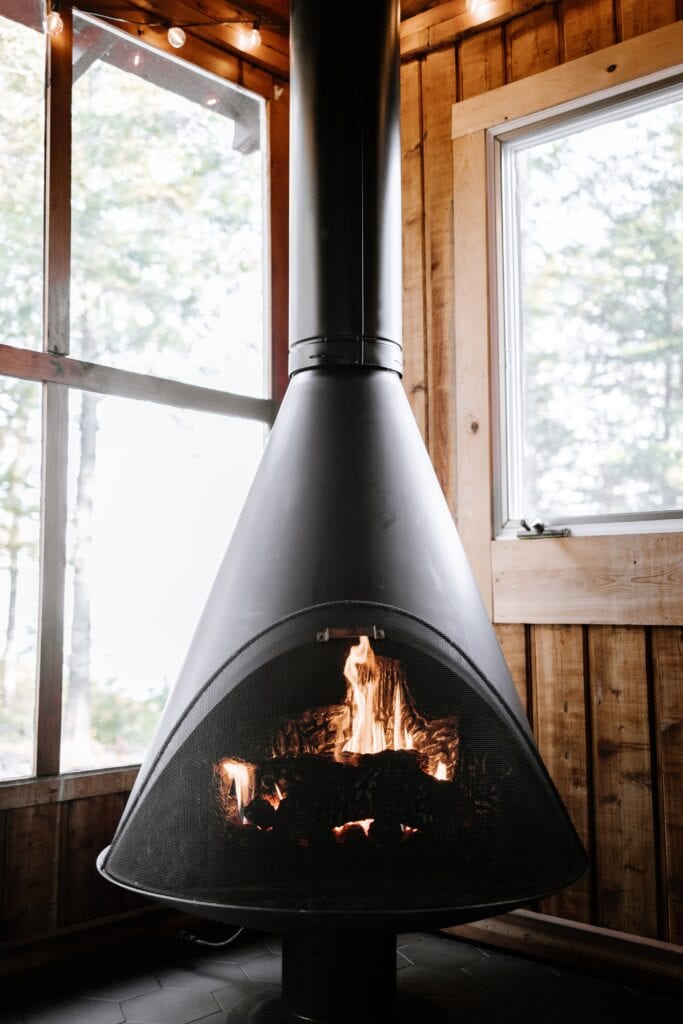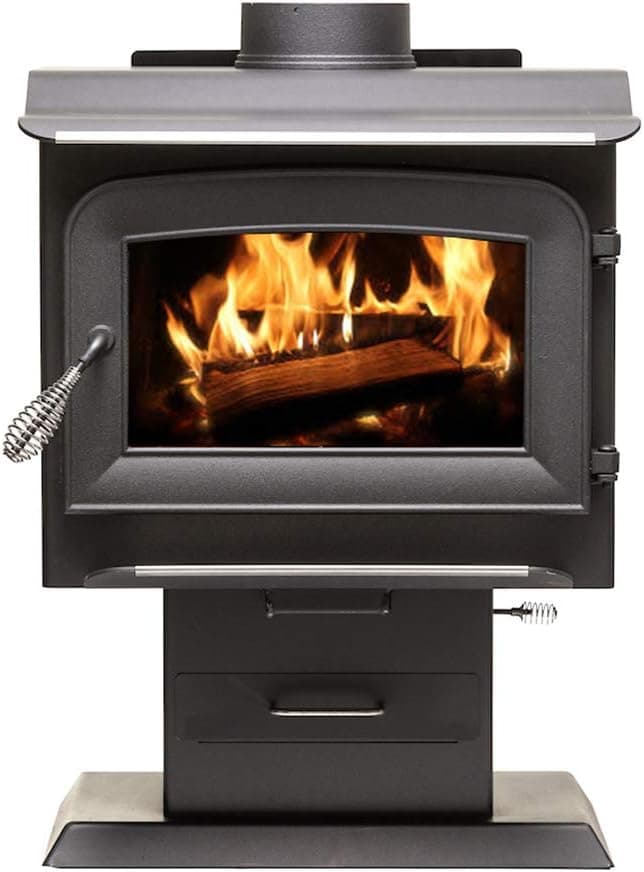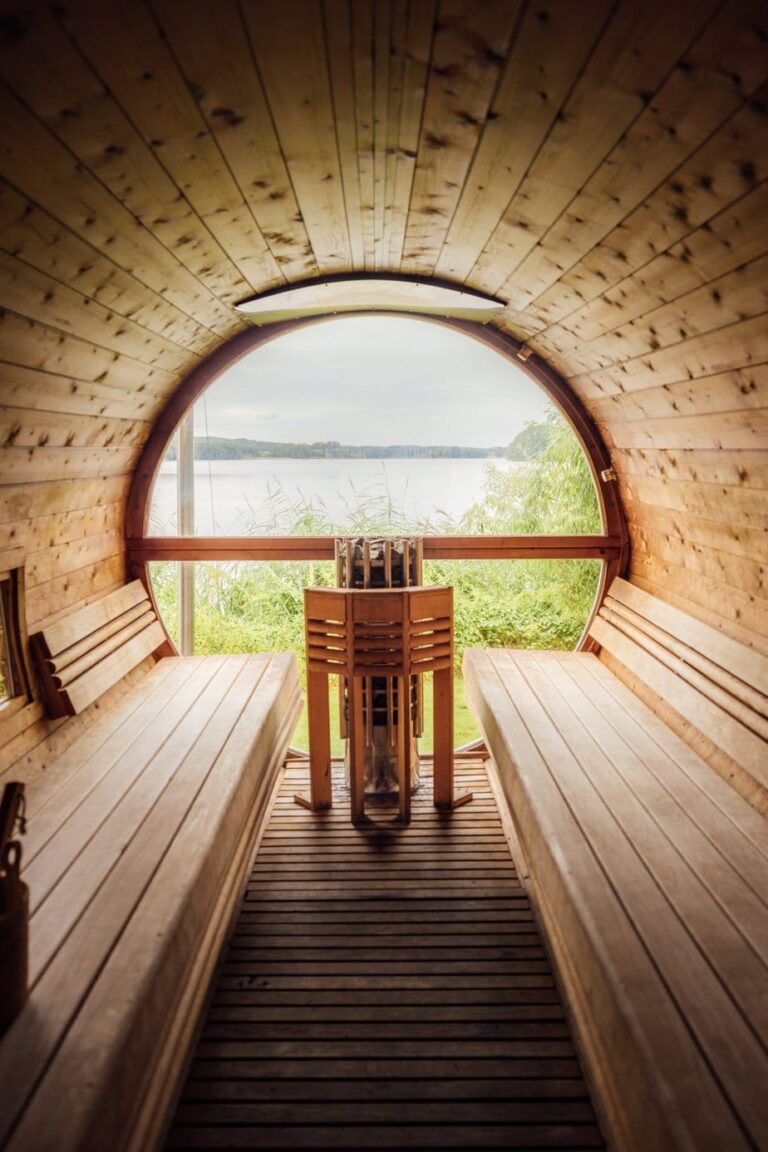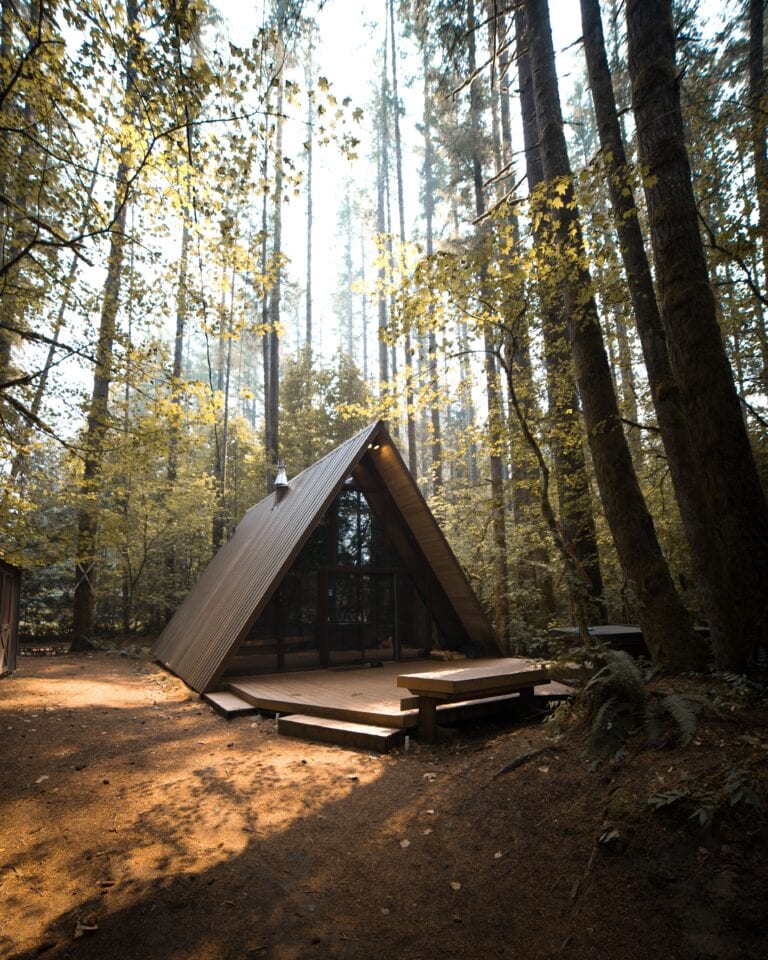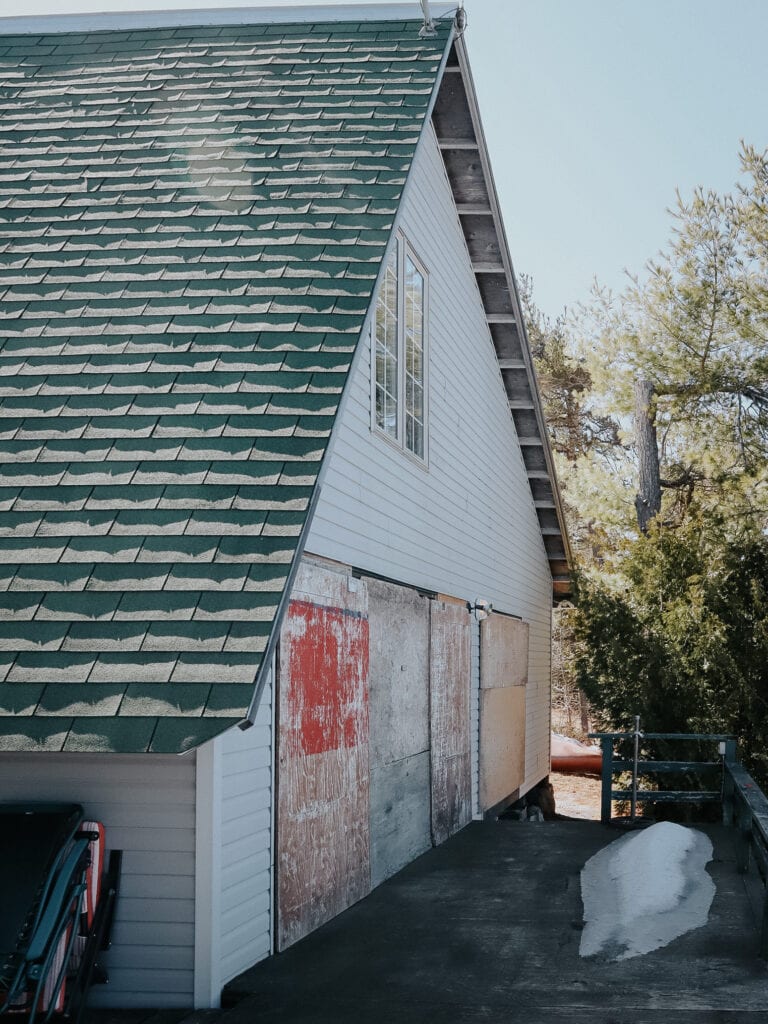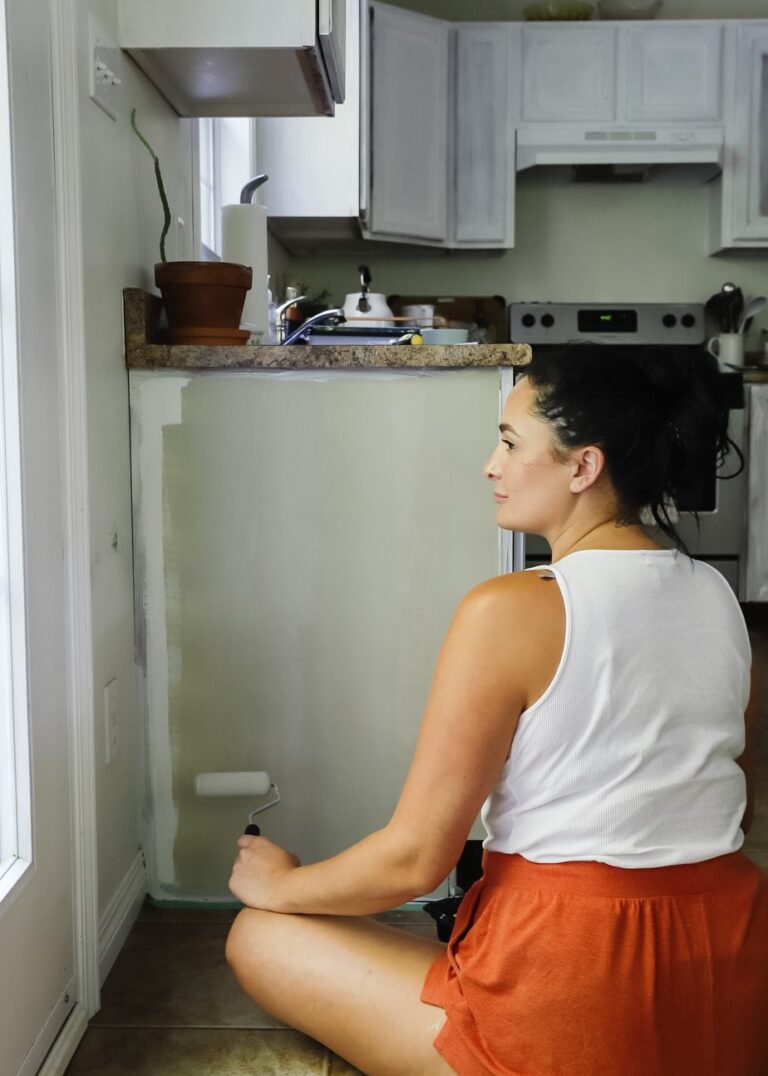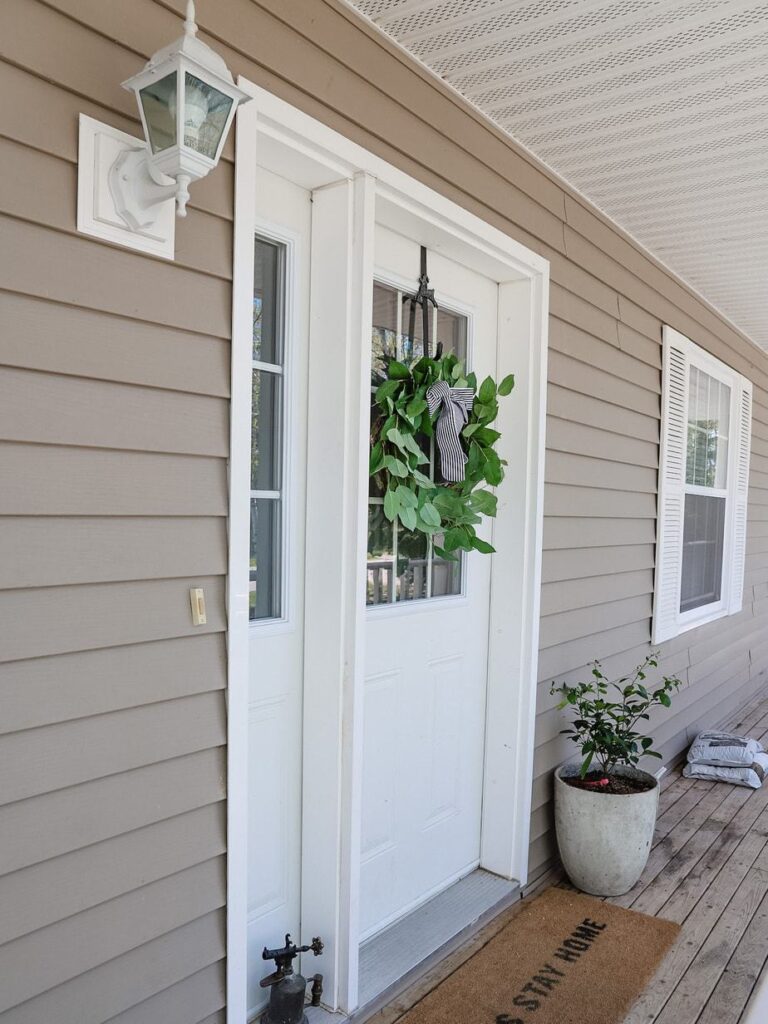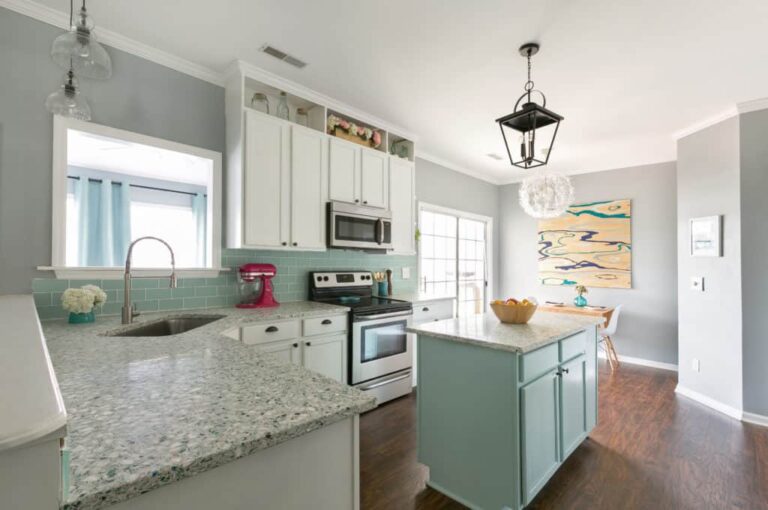The Ultimate Guide to Cabin Heaters and How to Choose the Right Heater
Post Summary: The best resource for heating your cabin this winter, with tips on finding the best cabin heater for your space (and we also added boat cabin heaters).
As the colder months approach, cabin owners know all too well the importance of finding an effective and reliable cabin heater. Whether you have a small cabin nestled in the woods or a boat cabin by the shore, staying warm and comfortable during winter is a top priority. In this blog post, we’ll explore various cabin heating methods and highlight the best ways to keep your living space warm and cozy.
If you were wondering, we’ve owned our little cabin for nearly two years. Before that, I grew up at the cottage, and I remember spending many winters bundled up by the space heaters trying to keep my toes warm.
This article is for you if you are searching for heating methods and detailed explanations of each method with our favorite, tried, and true heaters from Amazon.
Keep reading to find out the best cabin heater for your space.
The Best Cabin Heater for Your Home
Quick Guide to Cabin Heaters
Wood Stoves
Wood stoves have been a tried-and-true heating method for cabins for generations. They provide a rustic charm and can generate ample heat. However, they do require a lot of work in terms of sourcing and splitting wood and maintaining the stove. Proper ventilation systems and adequate clearances from the cabin roof and walls are crucial to prevent fire hazards.
Ashley Hearth Wood Stove
The Ashley Hearth AW1120E-P 1,200 Sq. can fit logs up to 18 inches in length. The firebrick lined for long life and combustion efficiency while large ash pan with brushed nickel handle makes cleanup easy
Check it out >
Of course, wood stoves have been a popular choice for cabin heating for many years, and they come with their own set of pros and cons. Let’s explore these aspects in detail:
Pros
1. Cost-Effective Heating
Wood is often readily available in wooded areas, making it a cost-effective fuel source. If you can source your firewood, heating with a wood stove can be much cheaper than other heating methods.
2. Independence from Utility Services
Wood stoves provide off-grid heating, making them an excellent choice for remote cabins that may not have access to electricity or natural gas. This independence ensures you can stay warm even in the most secluded locations.
3. Cozy and Ambiance
Wood stoves create a warm and cozy ambiance in the cabin. The sight and sound of crackling wood on the stove add to the overall charm of the living space, making it a welcoming and romantic atmosphere.
4. Reliable Heat Source:
Wood stoves are known for their reliability. They can provide consistent heat even during power outages, making them a dependable choice for keeping your cabin warm in all seasons.
5. Environmentally Friendly:
Burning wood is considered a carbon-neutral energy source because the carbon dioxide released during combustion is roughly equal to the amount absorbed by the trees during their growth. If you use sustainable wood sources, it can be an environmentally responsible heating option.
Cons
1. Labour-Intensive
One of the most significant drawbacks of wood stoves is the labor required to maintain them. This includes chopping, splitting, and storing firewood, as well as regularly cleaning the stove and chimney to prevent creosote buildup and fire hazards.
2. Safety Concerns
Improperly installed or used wood stoves can pose safety risks. Carbon monoxide poisoning, chimney fires, and the risk of burns are all concerns if not used with caution and maintained properly.
3. Limited Heat Control
Wood stoves provide radiant heat, which can make it challenging to control and distribute heat evenly throughout the cabin. The temperature may vary from room to room, and it can be difficult to adjust quickly.
4. Space Requirements
Wood stoves require adequate clearances from walls and combustible materials, which can limit their placement within a cabin. This can affect the layout and design of your living space.
5. Air Quality
So, our take is that wood stoves have their merits as cabin heaters, offering cost-effective and reliable heating with a cozy atmosphere. However, they also come with challenges related to maintenance, safety, and air quality. Whether a wood stove is the right choice for your cabin depends on your preferences, location, and willingness to commit to the necessary upkeep and safety measures.

OUR TAKE: While burning wood can be environmentally friendly when done correctly, it can also contribute to air pollution if not managed properly. Old or inefficient wood stoves may produce more particulate matter and emissions.
Electric Heaters
Electric heaters offer a convenient and portable heating solution. You can plug them into a power cord or rely on solar power if you have an off-grid cabin. Ceramic heaters, in particular, are known for their efficiency in heating small spaces and are a good idea for chilly drafts.
Portable Electric Indoor Space Heater
Small but mighty! We use this in our cabin, and we really enjoy it. This portable mini heater with a built in handle is easy to carry. It has an adjustable thermostat for comfortable warmth, ideal for small areas. The length of the cord is about 6ft to allow for optimal heat.
Check it out >
Pros
1. Ease of Use
Electric heaters are incredibly easy to use. You simply plug them into an electrical outlet, set the desired temperature, and they start warming the room. There’s no need to deal with fuel, firewood, or complicated installations.
2. Efficiency
Modern electric heaters are designed to be highly efficient, converting nearly all the electricity they consume into heat. This means you get a reliable and consistent source of warmth without energy waste.
3. Safety
Electric heaters are generally considered safe. They don’t emit harmful fumes or require ventilation systems like some other heating methods. Many models come with safety features such as tip-over protection and overheat protection.
4. Portability
Electric heaters are typically compact and portable, making them versatile for heating different areas of the cabin as needed. You can easily move them from room to room, and some even come with built-in wheels.
5. Cost-Effective Options
There is a wide range of electric heater models available, including affordable options that can fit most budgets. Additionally, some models offer energy-saving features, helping to keep electricity bills manageable.
Cons
1. Operating Cost
While electric heaters can be efficient, the cost of electricity can add up, especially during prolonged use in the winter months. The ongoing operational cost can be higher compared to other heating methods, such as wood stoves.
2. Limited Heating Capacity
Electric heaters may struggle to provide sufficient warmth in larger cabins or during extremely cold weather. You may need multiple heaters to adequately heat larger living spaces.
3. Dependency on Electricity
Electric heaters rely entirely on electricity, which can be a disadvantage during power outages. If your cabin is in an area prone to electrical disruptions, you might need a backup heating source.
4. Dry Air
Electric heaters can dry out the air in the cabin, potentially leading to discomfort, dry skin, and respiratory issues. Using a humidifier alongside an electric heater can help mitigate this problem.
5. Environmental Impact
While electric heaters themselves produce no direct emissions, the source of your electricity matters. If your electricity comes from fossil fuels, the environmental impact can be significant. Using renewable energy sources or improving the energy efficiency of your cabin can mitigate this issue.

OUR TAKE: Our take on electric heaters is that they offer convenience, ease of use, and safety as cabin heaters. They are particularly well-suited for smaller cabins or as supplemental heating sources. However, the cost of electricity and the potential limitations in heating capacity should be considered, especially for larger or more remote cabins. Ultimately, the choice of the best cabin heater depends on your specific needs, cabin size, climate, and budget.
Propane Heaters
Propane heaters, including portable propane heaters, are an excellent choice for cabin heating. They are easy to use and provide consistent warmth. Be sure to have a propane tank on hand, and remember to follow safety guidelines to avoid carbon monoxide poisoning.
Mr. Heater Propane Heater
Convenient top-mounted comfort control adjustable thermostat, with a battery-operated electronic ignition and comes with a wall mounting kit.
Check it out >
Pros
1. Portability:
Propane heaters are typically lightweight and portable, making them easy to move around the cabin as needed. This flexibility allows you to concentrate heat in specific areas or rooms.
2. Independence from Electricity:
Propane heaters don’t rely on electricity to operate, which is particularly beneficial for off-grid cabins. They can provide heat even when there’s no electrical power, ensuring you stay warm in remote locations.
3. Efficient Heat Output:
Propane heaters are known for their high heat output. They can quickly and efficiently warm up a space, making them a suitable choice for cabins in cold climates.
4. Versatility:
Propane heaters come in various types, including wall-mounted, floor-standing, and portable models. This versatility allows you to choose the most suitable option for your cabin layout and heating needs.
5. Cost-Effective Fuel:
Propane is a cost-effective fuel source, especially when compared to electricity in some regions. The cost of propane can be lower, making it a budget-friendly option for heating.
Cons
1. Fuel Storage:
Propane heaters require a propane tank or cylinder for fuel storage. You need to ensure you have an adequate supply of propane on hand, and tanks may need to be refilled or replaced periodically.
2. Indoor Air Quality:
Propane heaters can emit carbon monoxide (CO) and other combustion byproducts. Adequate ventilation and the use of propane heaters with built-in safety features, such as oxygen depletion sensors (ODS), are essential to prevent CO buildup and ensure indoor air quality.
3. Safety Concerns:
Propane heaters come with safety considerations, including the risk of fire or explosion if not used and maintained correctly. Regular maintenance, including checking for leaks and ensuring proper installation, is crucial.
4. Limited Run Time:
Propane heaters have a limited run time based on the capacity of the propane tank. You may need to monitor and refill tanks more frequently during extended cold spells, which can be inconvenient.
5. Initial Installation Cost:
While propane heaters can be cost-effective in the long run, the initial installation cost may be higher compared to some electric heaters or wood stoves. This includes purchasing the heater and propane tank(s).
6. Environmental Impact:
Propane is a fossil fuel, and its combustion does produce CO2 emissions. While propane heaters are relatively efficient, they are not as environmentally friendly as some renewable heating options.

Our Take: Propane heaters offer efficient and portable heating solutions, making them a popular choice for cabin heating, especially in off-grid or remote locations. However, they require proper safety precautions, ventilation, and ongoing fuel management. The choice of whether propane heaters are the best option for your cabin depends on factors such as your heating needs, location, safety considerations, and budget.
Direct Vent Heaters
Direct vent heaters, such as Mr. Heater, are designed to be highly efficient and safe. They draw in outside air for combustion and vent exhaust gases outside, reducing the risk of carbon monoxide buildup. They are also a great option for boat cabin heaters when shore power is available.
Pros
1. Efficient Heating:
Direct vent heaters are highly efficient, as they draw in outside air for combustion and vent exhaust gases directly outside. This means minimal heat loss and optimal heating efficiency.
2. Safety:
Direct vent heaters are among the safest heating options. They are sealed combustion units that prevent indoor air from mixing with combustion gases, reducing the risk of carbon monoxide (CO) poisoning.
3. No Need for a Chimney:
Unlike traditional wood stoves or fireplaces, direct vent heaters do not require a chimney or complex ventilation system. This simplifies installation and reduces maintenance.
4. Versatility:
Direct vent heaters come in various sizes and styles, making them suitable for different cabin sizes and aesthetics. You can choose wall-mounted or floor-standing models to fit your space.
5. Zone Heating:
Direct vent heaters allow for zone heating, which means you can selectively heat specific areas of the cabin, reducing energy consumption and heating costs.
6. Independence from Electricity:
Many direct vent heaters operate without electricity, making them a dependable choice for off-grid cabins or areas prone to power outages.
Cons
1. Initial Cost:
Direct vent heaters typically have a higher upfront cost compared to some other heating options. This includes the purchase of the heater itself and installation expenses.
2. Limited Heating Capacity:
Direct vent heaters may have limitations in terms of the amount of space they can effectively heat. Larger cabins may require multiple units, which can increase both installation and operating costs.
3. Venting Requirements:
While direct vent heaters simplify ventilation compared to traditional chimneys, they still require proper venting through an exterior wall. This can add complexity to the installation process.
4. Maintenance:
Like any heating system, direct vent heaters require regular maintenance, including cleaning the combustion chamber, checking for leaks, and replacing parts as needed.
5. Aesthetic Considerations:
Some people may find the appearance of direct vent heaters less appealing compared to traditional wood stoves or fireplaces, which can be a factor in cabin design and ambiance.
6. Fuel Source:
Direct vent heaters are available for various fuel sources, including natural gas, propane, or even pellet fuel. The availability of the chosen fuel source may be limited based on your cabin’s location.

Conclusion: In summary, direct vent heaters offer efficient and safe heating solutions, making them an excellent choice for cabin heating, particularly in terms of safety and energy efficiency. However, they may come with a higher initial cost and limitations in terms of heating capacity. The decision to use direct vent heaters depends on factors such as your cabin size, heating needs, safety concerns, and budget.
Natural Gas Heaters
If your cabin is equipped with a natural gas supply, you may consider a natural gas heater. They can provide reliable and consistent heating with a direct connection to your gas line.
Mr. Heater Natural Gas Heater
Wi-Fi enabled makes it possible for you to control the temperature from your phone! Tip-over-safe shut off, and mount to the wall to save space.
Check it out >
Pros
1. Cost-Effective:
Natural gas is often more cost-effective than electricity or other fuel sources. It typically offers lower heating costs, making it a budget-friendly option.
2. High Efficiency:
Natural gas heaters are known for their high energy efficiency, converting a significant portion of the gas into usable heat. This efficiency can help lower heating bills.
3. Continuous Supply:
Natural gas is delivered through pipelines, providing a continuous supply of fuel. You don’t need to worry about running out of fuel, as you might with propane or other fuel types.
4. Convenience:
Natural gas heaters are convenient to use. They can be easily controlled with a thermostat, allowing you to maintain a consistent and comfortable temperature in your cabin.
5. Clean Burning:
Natural gas is considered a cleaner-burning fuel compared to some other options like wood or oil. It produces fewer emissions and pollutants, contributing to better indoor air quality.
6. Reliability:
Natural gas heaters are reliable and can provide consistent heat even during power outages, assuming your heating system has a backup power source.
7. Low Maintenance:
Natural gas heaters typically require less maintenance compared to wood stoves or other combustion-based heating systems. This can save you time and effort.
Cons
1. Infrastructure Dependency:
You must have access to a natural gas supply in your area to use natural gas heaters. Remote or off-grid cabins may not have this option.
2. Installation Costs:
The initial installation of a natural gas heating system can be relatively expensive, especially if your cabin does not already have natural gas infrastructure in place.
3. Limited Portability:
Natural gas heaters are not portable, and their placement is fixed. You can’t move them around the cabin as you would with some electric or propane heaters.
4. Environmental Impact:
While natural gas is cleaner burning than some fuels, it is still a fossil fuel that contributes to carbon emissions. It may not be the most environmentally friendly heating option.
5. Safety Concerns:
Natural gas heaters require proper installation and regular maintenance to ensure safe operation. Gas leaks and carbon monoxide risks can pose safety concerns if not managed correctly.
6. Limited Fuel Source Options:
Natural gas heaters are designed specifically for natural gas, so you may not have flexibility in choosing alternative fuels in the event of supply disruptions.

Conclusion: Natural gas heaters offer cost-effective and efficient heating solutions, particularly in areas with access to natural gas infrastructure. However, their installation costs and dependence on gas infrastructure should be considered. The choice to use natural gas heaters as the best cabin heaters depends on factors such as your cabin’s location, budget, and access to natural gas supply.
Diesel Heaters
For cabins with a liquid-cooled engine or access to diesel fuel, diesel heaters are a long-run solution. They are efficient and can provide hot water in addition to cabin heating.
Diesel Heater All-in-One
The diesel heater is all in one and requires no installation, making it perfect for outdoor adventures like camping. The diesel air heater features a high safety system, allowing for hassle-free usage in various environments such as cars, RVs, ships, and indoors.
Check it out >
Pros
1. High Efficiency:
Diesel heaters are known for their high energy efficiency, converting a significant portion of diesel fuel into usable heat. This efficiency helps reduce heating costs.
2. Independence from Electricity:
Diesel heaters do not rely on electricity to operate, making them a dependable heating source for off-grid cabins or areas with frequent power outages.
3. Continuous Fuel Supply:
Diesel fuel is typically readily available, and you can store a large quantity for extended use. This ensures a continuous supply of fuel, reducing the need for frequent refueling.
4. Powerful Heating Capacity:
Diesel heaters can provide powerful and rapid heating, making them suitable for quickly warming up a cabin, even in cold climates.
5. Variety of Options:
Diesel heaters come in various sizes and types, including forced air heaters and hydronic (hot water) heaters. This allows you to choose the most suitable option for your cabin’s heating needs.
6. Clean Burning:
Modern diesel heaters are designed to burn diesel fuel efficiently and cleanly, resulting in lower emissions and better indoor air quality compared to older models.
Cons
1. Initial Cost:
The initial cost of purchasing and installing a diesel heater can be relatively high, depending on the size and type of heater. This can be a barrier for some cabin owners.
2. Maintenance Requirements:
Diesel heaters require regular maintenance, including cleaning, fuel filter changes, and occasional servicing to ensure safe and efficient operation.
3. Fuel Storage and Handling:
Storing diesel fuel safely can be a challenge, as it requires proper containers and ventilation. Handling and refueling with diesel fuel can be messy and may require extra precautions.
4. Noise:
Some diesel heaters can be noisy, particularly forced air models, which can be a drawback if you prefer a quieter cabin environment.
5. Environmental Impact:
While diesel heaters are efficient, burning diesel fuel does produce carbon emissions, which can contribute to air pollution and climate change. This may not be the most environmentally friendly option.
6. Safety Concerns:
Diesel heaters, like other combustion-based heating systems, require proper installation and maintenance to ensure safety. Risk factors include fuel leaks, carbon monoxide, and fire hazards.

Conclusion: Diesel heaters offer powerful and efficient heating solutions, making them a suitable choice for cabin heating, especially in remote or off-grid locations. However, their initial cost, maintenance requirements, and environmental impact should be considered. The decision to use diesel heaters as the best cabin heaters depends on factors such as your cabin’s location, heating needs, budget, and access to diesel fuel.
Solar-Powered Heaters
For those looking for sustainable options, solar-powered heaters are a great thing. They use solar panels to generate electricity, which can then be used to power electric heaters or other heating methods, depending on your setup.
Solar Panel Kit
This solar panel kit from Amazon has everything you need to get started. It’s safe, intuitive, and reliable.
Check it out >
Pros
1. Environmentally Friendly:
Solar-powered heaters are highly eco-friendly, as they utilize renewable solar energy, reducing greenhouse gas emissions and environmental impact.
2. Cost Savings:
Once installed, solar-powered heaters have minimal operational costs since they rely on free solar energy. This can result in significant long-term savings on heating bills.
3. Energy Independence:
Solar-powered heaters provide energy independence, reducing reliance on traditional heating fuels like propane, natural gas, or electricity. This can be especially advantageous for off-grid cabins.
4. Low Maintenance:
Solar heaters have relatively low maintenance requirements. They typically consist of durable components with few moving parts, reducing the need for regular servicing.
5. Silent Operation:
Solar heaters operate silently, creating a peaceful and quiet cabin environment without the noise associated with some other heating systems.
6. Government Incentives:
Depending on your location, there may be government incentives, tax credits, or rebates available for installing solar-powered heating systems, making them more affordable.
Cons
1. Initial Cost:
The upfront cost of purchasing and installing solar-powered heating systems can be relatively high. This includes solar panels, inverters, and other components.
2. Weather Dependence:
Solar heaters are dependent on sunlight, which means their effectiveness can be reduced on cloudy or overcast days and during the nighttime. Backup heating may be needed in such situations.
3. Space Requirements:
Solar panels require adequate space for installation, either on the roof of the cabin or in a nearby location with good sun exposure. This may not be feasible for all cabins.
4. Energy Storage:
To maintain heat during cloudy days or at night, you may need an energy storage solution, such as batteries. These storage systems can add to the overall cost.
5. Installation Complexity:
Proper installation of solar heating systems may require professional expertise, which can add to the overall installation cost.
6. Limited Heating Capacity:
Solar-powered heaters may not provide enough heat for larger cabins or in extremely cold climates, necessitating additional heating sources.

Conclusion: Solar-powered heaters offer sustainable and energy-efficient heating solutions, making them an attractive choice for cabin owners who prioritize environmental responsibility and long-term cost savings. However, their initial cost, weather dependency, and space requirements should be considered. The suitability of solar-powered heaters as the best cabin heaters depends on factors such as your cabin’s location, climate, budget, and willingness to invest in renewable energy solutions.
Kerosene Heaters
Kerosene heaters are another option, but they require proper ventilation and caution to prevent carbon monoxide buildup. Always use them in well-ventilated areas.
KeroHeat Indoor/Outdoor Heater
This kerosene heater is a great option and works perfectly indoors as it works outdoors. It also has an automatic shut-off and heat zones of up to 900 square feet.
Check it out >
Pros
1. Portability:
Kerosene heaters are typically lightweight and portable, making them easy to move around the cabin as needed. This flexibility allows you to concentrate heat in specific areas or rooms.
2. Independence from Electricity:
Kerosene heaters do not rely on electricity to operate, making them a dependable heating source for off-grid cabins or areas with frequent power outages.
3. Efficient Heating:
Kerosene heaters can provide efficient and rapid heating, making them suitable for quickly warming up a cabin, even in cold climates.
4. Long Burn Time:
A single tank of kerosene can provide extended burn times, reducing the need for frequent refueling compared to some other portable heaters.
5. Cost-Effective Fuel:
Kerosene is often more cost-effective than electricity or propane. It typically offers lower heating costs, making it a budget-friendly option.
6. Reliable Ignition:
Kerosene heaters usually have reliable ignition systems, reducing the risk of ignition failures in cold or harsh conditions.
Cons
1. Indoor Air Quality:
Kerosene heaters can emit fumes and combustion byproducts that may affect indoor air quality. Adequate ventilation is essential to prevent exposure to potentially harmful substances.
2. Safety Concerns:
Kerosene heaters come with safety considerations, including the risk of fire or combustion-related accidents. Proper installation, operation, and maintenance are crucial to ensure safety.
3. Fuel Storage and Handling:
Storing kerosene safely can be a challenge, as it requires proper containers and ventilation. Handling and refueling with kerosene can be messy and may require extra precautions.
4. Noise:
Some kerosene heaters can be noisy, particularly during startup and operation, which can be a drawback if you prefer a quieter cabin environment.
5. Odor:
Kerosene heaters can produce an odor during operation, which some people find unpleasant. Adequate ventilation can help mitigate this issue.
6. Limited Heating Capacity:
Kerosene heaters may have limitations in terms of the amount of space they can effectively heat. Larger cabins may require multiple units, which can increase both installation and operating costs.
7. Environmental Impact:
Burning kerosene produces carbon emissions, contributing to air pollution and climate change. It may not be the most environmentally friendly heating option.

Conclusion: kerosene heaters offer portable and cost-effective heating solutions, making them a suitable choice for cabin heating, especially in off-grid or remote locations. However, their potential impact on indoor air quality, safety considerations, and environmental concerns should be carefully weighed against their benefits. The decision to use kerosene heaters as the best cabin heaters depends on factors such as your cabin’s location, heating needs, budget, and willingness to manage fuel storage and safety measures.
Domestic Central Heating System
If you want the convenience of a central heating system, consider a domestic central heating system if your cabin is connected to the grid. While it may have a higher upfront cost, it can efficiently heat your entire living space.
Central Air Heating and Cooling System
Transform your existing central air conditioning system into a highly efficient mini-split setup with our state-of-the-art variable speed compressor featuring Inverter Technology. Say goodbye to old, inefficient central air conditioner units.
Check it out >

Pros
1. Efficient Heating:
Central heating systems are known for their efficiency in distributing heat evenly throughout the cabin, ensuring consistent warmth in all rooms.
2. Thermostat Control:
Central heating systems often come with programmable thermostats, allowing you to set and maintain your desired cabin temperature easily. This precision can enhance comfort.
3. Multiple Fuel Options:
Central heating systems can run on various fuel sources, including natural gas, propane, oil, electricity, or even renewable sources like solar or geothermal energy, providing flexibility based on your location and preferences.
4. Low Maintenance:
Many central heating systems require minimal maintenance, with fewer moving parts compared to some other heating methods.
5. Integration with Other Systems:
Central heating systems can be integrated with other systems, such as radiant floor heating or air conditioning, to provide year-round comfort in your cabin.
6. Quiet Operation:
Central heating systems, particularly forced-air systems, operate quietly, allowing for a peaceful cabin environment.
7. Ducted Distribution:
Ducted central heating systems can distribute warm air through ductwork, which can be routed discreetly through walls or ceilings to avoid interfering with the cabin’s aesthetics.
Cons
1. Initial Cost:
The installation of a central heating system in a cabin can be expensive, including the cost of the heater, ductwork (if applicable), and installation labor.
2. Space Requirements:
Central heating systems may require space for heating units, ducts, and vents, which could impact cabin layout and design.
3. Dependency on Infrastructure:
Central heating systems may require access to specific infrastructure, such as natural gas lines or electricity, which may not be available in all cabin locations.
4. Energy Efficiency:
While central heating systems are generally efficient, some older models may be less energy-efficient, potentially leading to higher heating costs.
5. Environmental Impact:
The environmental impact of central heating systems depends on the fuel source. Systems running on fossil fuels like oil or natural gas may contribute to carbon emissions.
6. Complex Installation:
Installing a central heating system may require professional expertise, adding to the overall installation cost.
7. Heat Distribution:
In larger cabins or cabins with uneven layouts, ensuring consistent heat distribution can be challenging without careful design and maintenance of the heating system.

Our Take: Domestic central heating systems can provide efficient and reliable heating for cabins, offering precise control and even heat distribution. However, their initial cost, space requirements, and potential dependencies on infrastructure should be considered. The suitability of central heating systems as the best cabin heaters depends on factors such as cabin size, location, budget, and preferences for heating control and distribution.
Xtreme Heaters and Other Boat Cabin Heaters
We had to include this because I noticed some of you were looking specifically for boat cabins, Xtreme Heaters are built to withstand harsh marine environments. They are the best way to ensure your boat cabin remains warm even during the colder months
Caframo SEEKR by Caframo, Pali
The Caframo SEEKR, meets all ignition protection guidelines and standards. Plus it has a safe thermostat temperature control, and so much more.
Check it out >
Pros
1. Marine-Specific Design:
Xtreme heaters and boat heaters are designed to withstand the harsh marine environment, including exposure to saltwater, humidity, and temperature fluctuations, making them well-suited for cabins on boats.
2. Compact Size:
Boat cabin heaters are typically compact and can fit into tight spaces, making them ideal for the limited space available on boats and in cabins.
3. Efficient Heating:
The Xtreme heater is designed to provide efficient heating in enclosed spaces. They can quickly warm up small cabins, helping to maintain a comfortable onboard temperature.
4. Safety Features:
Many boat cabin heaters come with safety features like automatic shut-off mechanisms, low oxygen sensors, and flame failure detection, ensuring safe operation in enclosed spaces.
5. Low Power Consumption:
Boat cabin heaters are often designed to be energy-efficient, minimizing the drain on the boat’s electrical system or fuel source.
6. Quiet Operation:
Boat cabin heaters are generally engineered to operate quietly, allowing for a peaceful and comfortable onboard experience.
7. Variety of Fuel Options:
Boat cabin heaters are available in different fuel types, including electric, propane, diesel, and solid fuel, allowing boat owners to choose the most suitable option for their needs and fuel availability.
Cons
1. Specific Application:
Xtreme heaters and boat cabin heaters are designed primarily for boat cabins and smaller enclosed spaces. They may not be suitable for larger cabins or buildings.
2. Installation Complexity:
Proper installation of boat cabin heaters may require specific knowledge and expertise related to marine systems, which could be challenging for some boat owners.
3. Limited Heating Capacity:
Due to their compact size, boat cabin heaters may have limitations in terms of the amount of space they can effectively heat. Multiple units may be needed for larger cabins.
4. Cost:
High-quality marine-specific heaters can be relatively expensive compared to standard cabin heaters, particularly when considering the need for marine-grade components.
5. Fuel Availability:
The availability of the chosen fuel source (e.g., propane, diesel) may vary depending on the region and where the boat is docked or moored.
6. Regular Maintenance:
Just like any other heating system, boat cabin heaters require regular maintenance to ensure safe and efficient operation. This includes cleaning, inspections, and, if necessary, repairs.

Our Take: Xtreme heaters and other boat cabin heaters are well-suited for the specific challenges of boat cabins, offering efficient heating and safety features. However, their limited capacity, cost, and need for proper installation and maintenance should be considered. The decision to use boat cabin heaters as the best cabin heaters depends on your cabin’s size, location, and the specific requirements of your boat or marine vessel.
The best cabin heater for you depends on your specific needs and the resources available to you. Whether you prefer the cozy ambiance of a wood stove, the convenience of electric heaters, or the efficiency of direct vent or propane heaters, there are plenty of options to keep your cabin warm during the colder months.
Just be sure to do your research, follow safety guidelines, and stay warm and cozy in your cabin oasis. And if you’re looking for a great deal, don’t forget to check for free shipping options and discounts on your chosen heater through online retailers or forums like the Small Cabin Forum.

